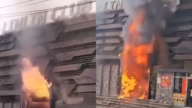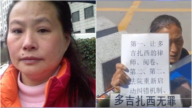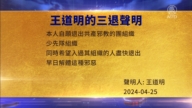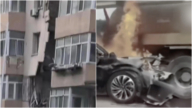【新唐人2011年4月13日讯】今年,中国6244亿元的的天价维稳费引发全球的争议。西方媒体包括《美国之音》、《法广》电台、华尔街日报等,以及香港媒体《明报》都进行了报导。最近,中共官方《新华网》针对《法广》的报导,进行了猛烈攻击,声称中国只有“公共安全”费用,没有“维稳费”这个说法,指责《法广》偷换概念、制造噱头。到底谁在偷换概念呢?我们来听专家的分析。
在《新华网》这篇署名周继坚的文章中,一开篇,就否认了中共政府预算中没有“维稳”这一项。并且声称,《法广》提到的“中国维稳预算”达到6244亿元人民币,其实是“公共安全”支出。
陈志飞(纽约市立大学教授):“‘维稳’实际上带有很浓厚的政治意识形态色彩的,这么个词,它明确是倾向于中共维持现在的统治,‘公安’其实是一个大家普世公认的一个辞汇,说要维持‘公共秩序’,所以中共很难,不太愿意把它的‘公安’跟‘维穏’连在一起,所以它用了‘公安’这个词。实际上它的意义是一样的,‘维稳’的主要力量来自于公安或者武警,那么从这方面来说呢,我觉得《法广》没有犯任何错误,而恰恰是中共自己在偷换概念。”
这篇文章还声称,中国的“公共安全支出”是随着财政收入的增长而增长的,并不是像《法广》所说的,需要应付“严重的社会不稳定”局面。
陈志飞指出,中国国家财政收入如果增加的话,急需投入的地方太多了,而不应该用去增加所谓的“公共安全”费用。
陈志飞:“因为我们现在知道,中国的失业率很高,社会福利费用很高,大学生就业很难、看病也很难,为什么不把钱投到那些地方去呢?如果去比较一下,那些最需要钱的地方,它的增长幅度远远低于中共投的安全或维稳上面的费用。”
《华尔街日报》报导,今年中共两会发布2010年预算执行情况报告显示,去年的“医疗开支”仅占GDP的1.2%,落后于巴西和南非等同样是新兴市场的国家。
另外,“教育公共开支”占GDP的3.1%。根据教育部财务司及国家统计局公布的数据计算,中国国家财政性教育经费支出,10年累计“欠账”已达16843亿元。可是,中国的“公共安全支出”却一直呈现增长的态势。
陈志飞:“对它来说,实际上是一个红朝末世的一个状态,而根本不是它所说的盛世的一种情况。从这些数据来说,更可以看出,中共内部、社会实际上是不稳定的,而且,人民对它已经没有任何希望了,造成了它自己所说的维稳的费用日益庞大,达到了不可收拾的局面。”
陈志飞认为,《新华社》指责《法广》偷换概念,把“公共安全费”视为“维稳费”,其实,恰恰也在指责自己。
陈志飞:“如果这个社会真正稳定的话,它是不在意别人怎么评价它的。因为没有美国人会在意中共《人民日报》或者中共别的喉舌天天说美国怎么怎么不稳定,因为我们很稳定,没有人会在乎它说这个。中共为什么会在乎《法广》这么说呢?我觉得中共可能道出了天机,就它自己社会太不稳定了。”
《新华网》2010年6月9号,转载了《光明日报》一篇题为《“天价维稳”的无底洞有多深?》的文章,文章一开始援引《社会科学报》的内容指出,“2009年维稳财政预算执行情况令人震惊:全国内保费用达到5140亿元,已接近军费的数额。”
这篇文章还提到,中国各地近年纷纷成立“维稳办”、“综合治理办”、“应急办公室”等机构,以致维稳费猛增。
对此,《法广》表示难以理解,《新华网》为什么不批评自己转发的文章,而偏偏对他们的报导“情有独钟”呢?
新唐人记者林平、李静、薛莉采访报导。
Changing Facts on Stability Maintenance
China’s astronomical price of “stability maintenance"
this year caused global controversy. Many Western
media reported it, including Voice of America,
Faguang Radio, Wall Street Journal
and Hong Kong’s Ming Pao, Recently, Xinhua,
media of the Chinese Communist Party (CCP)
attacked Faguang, claiming that it was trying
to change the subject to grab attention,
and that China only has “public safety" expenses
instead of “stability maintenance" expenses.
But let’s listen to expert’s analyses to find out
who really is trying to change the subject?
The article from Xinhua, signed by Zhou Jijian,
denies from its beginning the existence of a budget
for “stability maintenance". However, it claims
that the RMB624 billion mentioned by Faguang
is actually a public safety expenditure.
Chen Zhifei (New York City University professor):
“’Stability maintenance’ carries strong political
overtone, and leans to the current safety system.
‘Public safety’ is recognized by the masses.
Chinese authorities do not want to link
stability maintenance and public safety together.
Yet the meaning is the same. Stability maintenance
comes from public security or armed police.
From that standpoint, I think that Faguang did not
make a mistake, but it is the CCP
that tries to change a concept.”
The article also claims that China’s ‘public safety’
expenditure increases due to the growth in financial
revenue, not due to increased social instability.
Chen Zhifei points out that if China’s fiscal revenue
increases, there are many areas needing money.
Why only increase the public safety expenditure?
Chen Zhifei:"We know that China has a high rate
of unemployment, high cost of social welfare,
it’s tough for college graduates to find a job,
there’s lack of health care, so why not invest money
in those areas? In comparison, spending
in those areas would be far lower than that
of ‘public safety’ or ‘stability maintenance’.”
The Wall Street Journal reported that the budget
performance report of 2010 released during
the ‘two meetings’ showed that China’s
medical expenses for 2010 were only 1.2% of GDP,
behind emerging markets of Brazil and South Africa..
In addition, the ‘public education expenditure’
accounted for 3.1% of GDP. According to
the Ministry of Education and Finance and
the National Bureau of Statistics,
China is very far behind in educational spending,
a total of RMB1.6843 trillion for the past 10 years.
However, China’s “public safety expenditure"
has been showing a growing trend.
Chen Zhifei: “This means the end of a state instead
of prosperity. From these data, one can see the society
under the Chinese regime is not stable, but the people
have given up hope for it. Thus, the cost
to ‘maintain stability’ is getting beyond control.”
Chen Zhifei believes that Xinhua accused Faguang
of replacing public safety fee
with stability maintenance fee.
In fact, it also accuses itself at the same time.
Chen Zhifei: “If this society is indeed really stable,
it would not care how others evaluate it.
Americans do not care what People’s Daily
or other mouthpieces of the CCP say,
because we are very stable. So why should CCP
be bothered by Faguang? I say that the CCP
reveals a secret: its society is very unstable.”
On June 9, 2010, Xinhua reprinted an article from
Guangming Daily: “A bottomless pit for ‘stability
maintenance’.” The article quoted content from
Social Science Journal that in the 2009 budget report,
the price of stability maintenance reached
RMB514 billion, close to that of military spending.
The article also mentioned that in recent years,
the Stability Maintenance offices,
Comprehensive Management offices and
Emergency Response offices were all over China,
so that stability maintenance costs soared.
In this regard, Faguang does not understand why
Xinhua did not criticize the article they reprinted
but favored only Faguang’s report?
NTD reporters Lin Ping,Li Jing and Xue Li





























